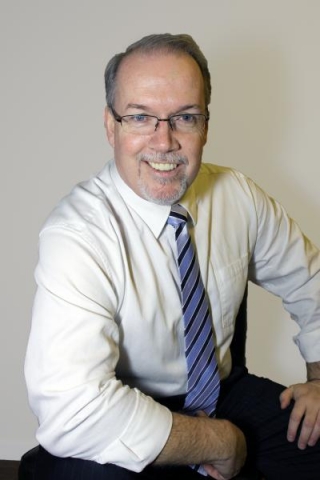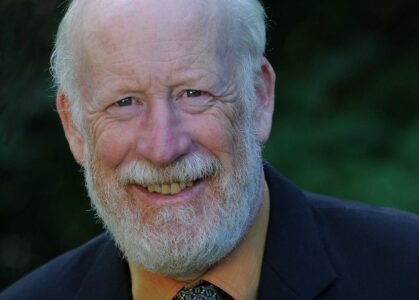Next up: the NDP title fight. Is Horgan the 'Happiest Warrior?'
John Horgan has set himself a heavy task. The committed, candid NDP leadership candidate is determined to convince a politics-weary B.C. populace that policy debate in this province can be a little less mean, and a lot more meaningful.
Arrogance makes for bad government, Horgan declared from local MLA Katrine Conroy’s Castlegar office last week, at the beginning of a campaign sweep through the Kootenays. He could easily shop around the ever-growing Opposition list of grievances against the governing BC Liberals, he said (and probably get a good takeup in many areas of the province, including this one). But he’d rather run a campaign of ideas.
First elected in 2005 and energy critic since 2006, Horgan is known for his well-researched, hardnosed and often humourous approach to the file. He’s an especially passionate critic of public-private partnerships, particularly those – like run-of the-river hydro – that involve energy provision and sale, where he’d like to see a moratorium and evaluation of who’s really benefitting.
Other recent ideas include a move to bring controversial offshore aquaculture on-land, the renewal of the ‘Buy BC’ local agriculture promotional program, and support for the existing federal offshore oil and gas exploration moratorium, which the existing government maintains support for but often hints at a desire to let lapse.
The Kootenays are an interesting region for an energy advocate, with the region’s long history in hydro and a community-centric economic development model in the Columbia Basin Trust that the NDP are keen to talk up – having been responsible for its inception in 1995. Local control is key to rural economic development, Horgan said.
“There is a need to decentralize decision-making, to give people the tools they need. And ‘tools’ means money,” he said emphatically.
Improving any public offering – education or health care, for instance – starts with thoughtful economic development. “You need clients, and the more people in a region, the more dynamic health care can be. How you have a vibrant health care region is you have a vibrant economy.”
The proposed model involves handing increased control to local decision-makers, and including stronger requirements for community consultation and benefit in large-scale provincial projects and private investments, such local job creation and enhanced environmental protection provisions. It’s no overly onerous or radical new idea, Horgan insisted, and has long been required by law when projects impact First Nations.
“Government sets the table,” Horgan said.
Such an approach would focus on the differing core strengths of BC’s various regions. The Kootenays have advantages in power provision, he said. Mining was not specifically mentioned. And forestry’s no lost cause; the first step is tenure reform, and a shift to the value-added segment of the industry–being mindful of existing trade agreements and other constraints on government intervention, of course. We have NAFTA, TILMA and a troublesome softwood lumber agreement with the U.S., among other complexities, to consider.
As with much of his other messaging, Horgan is walking a bit of a tightrope here.
He’s eager to be the NDP’s business-friendly candidate, professing himself equally comfortable with “captains of industry,” the party’s more traditional base, and the rest of us. As optimistic targets go, he’d like to capture the “four-to-five per cent of the electorate” that have never voted for the NDP. Even in the Kootenays, such stats might be a stretch.
Horgan would also like to be considered an experienced candidate, as well as a “fresh face.” A two-term MLA elected in 2005 and 2009, Horgan has had a lifelong career in politics, starting with an entry-level Ottawa job and progressing to key political posts in NDP premiers’ offices under Mike Harcourt, Dan Miller and Glen Clark.
Any finally, this candidate brands himself a conciliator, but one who knows how to throw a political punch.
BC faces huge challenges, especially concerning our resource-based economy, in education, and on the climate change and environmental fronts, he said.
“People need and deserve a to and a fro. . . . I believe that when Carole [James] stepped down and Gordon Campbell was leaving the stage, [that left an opportunity for] conciliation between the two camps. . . . These are big, big issues. . . . We can’t come up with solutions if we just camp up again. I believe that the messages are not dissimilar [so] what are the problems and how do we fix them? I’ll work with anyone.”
This province has heard this before. In fact, we heard it when James was elected NDP leader and nudged her party to the centre in an attempt to broaden its appeal. It was a move some strategists opposed, feeling that it watered down her support on the party’s active left wing, while making minimal inroads into the elusive world of business support. It also, at times, left her looking weak within BC’s extremely partisan political climate.
But Carole James is not very tall.
“I’m 6’2” and I can give as good as I get on the partisan front,” said Horgan. “I will confront those who are combative and I will cooperate with those who are cooperative. If someone has a good idea, well, let’s expand on that a little bit. I’m a happy warrior.”


























